
-
Find the right food for your petTake this quiz to see which food may be the best for your furry friend.Find the right food for your petTake this quiz to see which food may be the best for your furry friend.Featured products
 Small & Mini Mature Adult 7+ Dog Food
Small & Mini Mature Adult 7+ Dog FoodHill's Science Plan Small & Mini Breed Mature Adult Dog Food with Chicken is a complete pet food, specially formulated with ActivBiome+ Multi-Benefit Technology.
Tailored nutrition to support graceful ageing in small dogs. Specially made with a synergistic blend of nutrients for energy & vigor.Shop Now Perfect Digestion Small & Mini Adult Dog Food
Perfect Digestion Small & Mini Adult Dog FoodHill's Science Plan Perfect Digestion Small & Mini Breed Adult Dog Food with Chicken & Brown Rice supports ultimate digestive well-being & a healthy microbiome.
Shop Now Perfect Digestion Large Breed Puppy Food
Perfect Digestion Large Breed Puppy FoodPrecisely balanced nutrition with Hill's ActivBiome+ prebiotic blend actively contributes to supporting digestive health and overall well-being to help your pet feel their best
Shop NowFeatured products Hypoallergenic Dry Cat Food
Hypoallergenic Dry Cat FoodHILL'S SCIENCE PLAN Hypoallergenic Adult cat food with egg & insect protein is a complete pet food for adult cat 1–6 years old. It's formulated for cats with delicate skin and stomach, with limited high quality novel protein sources & no grain.
Shop Now Kitten Food
Kitten FoodHill's Science Plan Kitten Wet Cat Food Premium Chunks in Sauce with Chicken is a complete pet food for kittens and for pregnant or nursing cats
Shop Now Hairball & Perfect Coat Adult Cat Food
Hairball & Perfect Coat Adult Cat FoodHill's Science Plan HAIRBALL & PERFECT COAT Adult cat food with Chicken is specially formulated to effectively help avoid hairball formation in adult cats while promoting a beautiful coat. Thanks to its mix of essential Omega-6 fatty acids, this food benefits the cat's skin and fur keeping them healthy and shiny. Our Advanced Fibre Technology helps reduce hairballs by naturally promoting their passage through the gut. This food is formulated with high-quality protein for a perfectly balanced, great-tasting recipe.
Shop Now -
Dog
- Dog Tips & Articles
-
Health Category
- Weight
- Food & Environmental Sensitivities
- Urinary
- Digestive
- Joint
- Kidney
-
Life Stage
- Puppy Nutrition
- Adult Nutrition
- Senior Nutrition
Cat- Cat Tips & Articles
-
Health Category
- Weight
- Skin & Food Sensitivities
- Urinary
- Digestive
- Kidney
-
Life Stage
- Kitten Nutrition
- Adult Nutrition
Featured articles The Right Diet For Your Pet
The Right Diet For Your PetLearn what to look for in healthy pet food & nutrition, including ingredients, quality of the manufacturer, your pet's age, and any special needs they have
Read More Understanding Your Pet's Microbiome
Understanding Your Pet's MicrobiomeLearn what a pet's microbiome is, how it contributes to your pet's gut & overall health, and why nutrition is important in maintaining healthy microbiomes.
Read More Pet Food Storage Tips
Pet Food Storage TipsWhere you store your cat and dog food can make a big difference in the quality and freshness once it is opened. Here are some common questions and recommendations for optimal storage for all of Hill’s dry and canned cat and dog food.
Read More -
Digestive health for dogs
Digestive health for dogs
What are dog digestive issues?
A digestive disorder is any health situation that prevents your dog from properly digesting food or alters the rate that food passes through their digestive tract. Don’t ignore the signs! If your furry friend is showing symptoms of digestive disorders, seek immediate advice from your veterinarian.

Know the signs of distress
Some signs of your dog’s digestive problems are easy (and unpleasant) to spot. Make sure you consult with your vet if your dog shows any of these signs:








Know the signs of distress
Some signs of your dog’s digestive problems are easy (and unpleasant) to spot. Make sure you consult with your vet if your dog shows any of these signs:








What causes dog digestive problems?
Digestive upsets can happen for a variety of reasons, and all of them can make your dog feel under the weather. Here are some of the more common causes of digestive problems in dogs.


This is the most common cause of an ‘upset stomach’ in dogs. It usually consists of vomiting and diarrhoea that begins suddenly but can just be diarrhoea too. It can be caused by lots of things like eating something unsavoury (we all know our dogs love doing this!), parasites, viruses and foreign bodies, to name but a few.
Unlike the sudden onset upset we just mentioned, chronic enteropathies are slower to appear and tend to last a long time. Diarrhoea and weight loss are common signs. Again, it can be caused by many different things such as adverse food reactions and genetics.
The colon is part of the large bowel and when this gets inflamed it’s called colitis. It’s usually very characteristic and most dogs show the same signs - looking like they urgently need to have a poo, they might strain to have a poo but not much comes out, and one of the classic signs of colitis is fresh blood and/or slimy mucus in the stools.
This is a serious condition in dogs and can be life-threatening. Common signs of pancreatitis are sudden onset vomiting, depression and lack of appetite. It’s also a very painful condition so your dog may be restless and adopt the ‘play bow’ position to try to ease the pain. If you have any concerns that your dog might have pancreatitis get them to the vet as soon as you can.
For more detailed information, read this article on Pancreatitis in dogs.
This complicated-sounding name describes a condition where dogs are lacking certain enzymes needed for digestion. The pancreas produces some of these and when they are lacking the food passes straight through without the dog being able to get at the nutrients. Dogs with EPI tend to be ravenously hungry but still lose weight and look in poor condition. Because they don’t digest fat well, their stools may be greyish in colour. Some breeds such as German shepherds are more prone to it than others. Usually supplementing the diet with the missing enzymes gives a good result.
Dogs can react badly to certain foods for a number of reasons and together we call these adverse food reactions. True food allergies are rarer than people think and they tend to be caused by proteins in foods such as beef and chicken. Food allergies can cause vomiting and diarrhoea and also skin issues like itchiness.
For more on managing a dog with a sensitive stomach, see this detailed article.
The same as in humans, when dogs are constipated, they find poopng difficult and they might go to the toilet much less frequently. Constipation can be caused by lots of things. Eating bones can make the stools hard and difficult to pass, dehydration or a sluggish bowel will also mean that the stools are dry and difficult to shift.
For more insights, visit this detailed article on dog constipation.
How can you help?
First, if you suspect your dog is suffering from a digestive disorder, talk to your vet about treatments that may be able to help. You can further help your dog by reducing the amount of stress triggers in their environment with some of these suggestions:
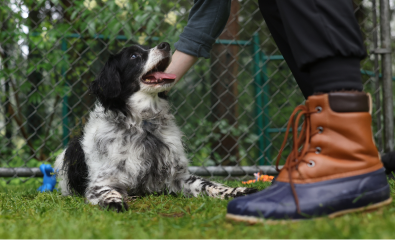

Stick with a routine
Dogs love predictability. Knowing they can anticipate when you’ll arrive home, when meals will appear and when it’s time for a walk will help keep your dog’s anxiety to a minimum.


Stress Management
Ask your veterinarian for a recommendation that could help address your dog’s stress response in anxiety-inducing situations.
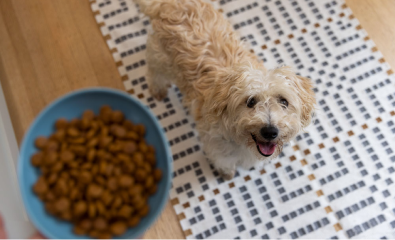

Consider their nutrition
Foods made with highly digestible ingredients can be gentle on upset tummies. Ask your veterinarian about switching your dog’s food and how to do it without upsetting your dog’s stomach any further.
How can you help?
First, if you suspect your dog is suffering from a digestive disorder, talk to your vet about treatments that may be able to help. You can further help your dog by reducing the amount of stress triggers in their environment with some of these suggestions:


Stick with a routine
Dogs love predictability. Knowing they can anticipate when you’ll arrive home, when meals will appear and when it’s time for a walk will help keep your dog’s anxiety to a minimum.


Stress Management
Ask your veterinarian for a recommendation that could help address your dog’s stress response in anxiety-inducing situations.


Consider their nutrition
Foods made with highly digestible ingredients can be gentle on upset tummies. Ask your veterinarian about switching your dog’s food and how to do it without upsetting your dog’s stomach any further.
More products
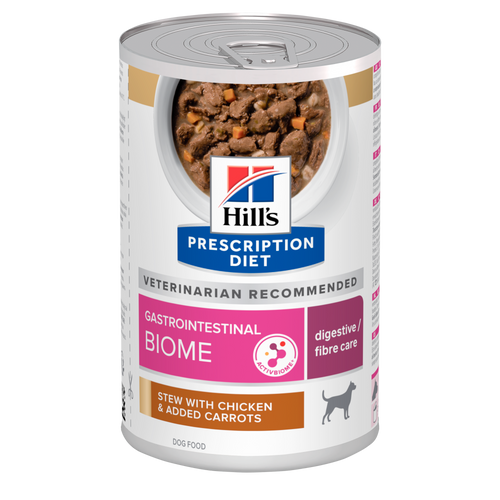
Hill’s Prescription Diet Gastrointestinal Biome is a high-fibre wet dog food clinically shown to help firm loose stool in 24 hours and reduce risk of recurrence. Made with ActivBiome+ Ingredient Technology to rapidly activate the gut microbiome and help manage complex GI issues.
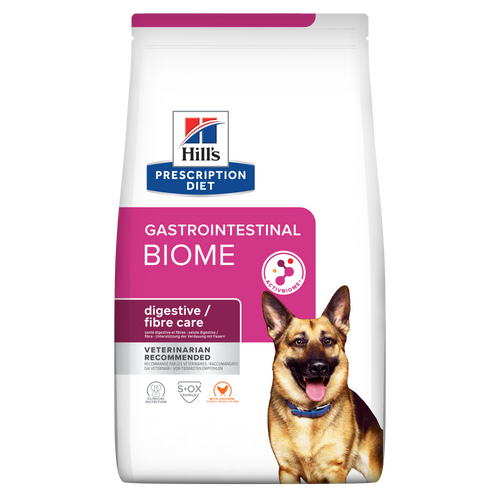
Hill’s Prescription Diet Gastrointestinal Biome is a high-fibre dry dog food clinically shown to help firm loose stool in 24 hours and reduce risk of recurrence. Made with ActivBiome+ Ingredient Technology to quickly nourish the gut microbiome and help manage complex GI issues.
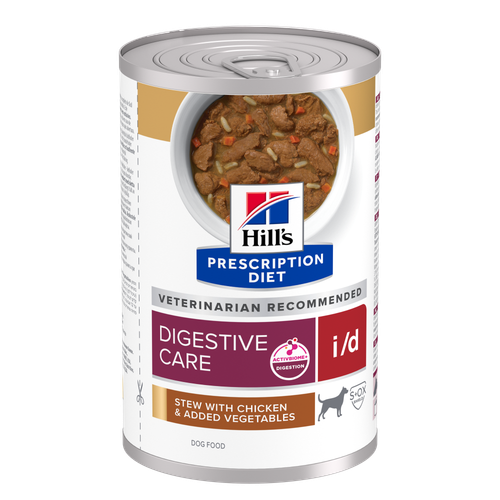
Highly digestible nutrition clinically proven to help reduce digestive upsets.
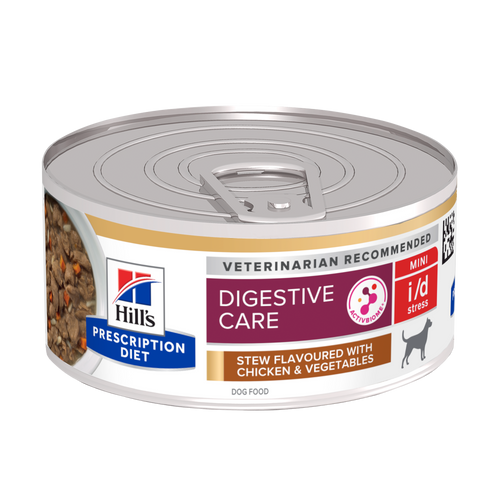
Hill's Prescription Diet i/d Stress Stew is great tasting nutrition in a proprietary anti-stress formula to manage stress & stress-related digestive upsets in small and medium breed dogs. Fortified with Hill's breakthrough ActivBiome+ Ingredient Technology clinically shown to rapidly activate the gut microbiome to support digestive health and well-being.
Related articles
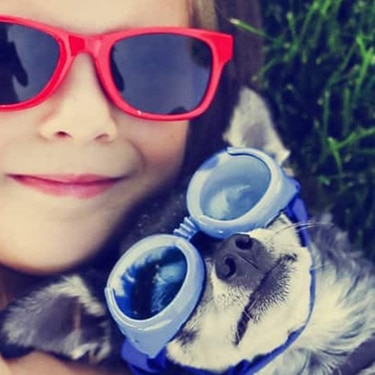
Learn how to make frozen dog treat recipes that can help keep your pup cool in the summer heat, including which ingredients work best to keep him hydrated.
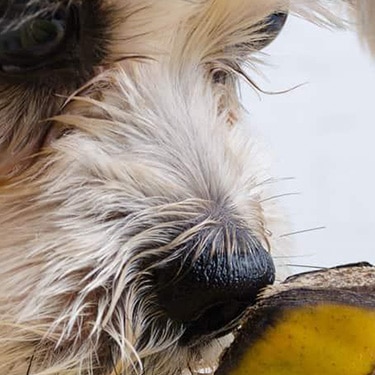
Dogs go bananas for human food. However, many foods consumed regularly by humans aren't good for dogs, and some are downright harmful. But can dogs eat bananas? Here's the lowdown on bananas for dogs and why you might want to consider giving your dog an occasional bite of this vitamin-rich fruit.

Find the ideal feeding plan for your puppy with Hill's Pet puppy foods

Read to learn about 5 human foods that are toxic to dogs. Learn their effects on a dog's health and what to do if they accidentally eat one of these foods.

